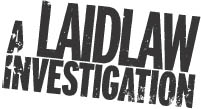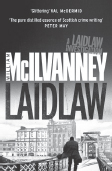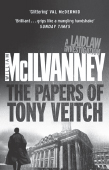Strange Loyalties (37 page)
Authors: William McIlvanney

âDon't laugh at this,' he said. âWhat I think I've done with it is try to be as good a man as I can be. Bev became the meaning of my life. Her and the kids. I wanted that things should be right for them. Beyond that, just do the best I can for everybody else. That's all. The house, everything's in Bev's name. I've got a horror of possessions. Anything in here that's mine, Bev bought for me. Every year I set aside whatever I can for charities. I've never knowingly cheated another person
since that night. I've never been unfaithful to Bev. It's pathetic, isn't it? To think that changes anything. Because I still shared in what happened. And it still happened. And this may be technically Bev's house. But I live in it comfortably enough, don't I? And it's still built on the bones of a dead man. My life remains a lie, no matter how white I try to make it.'
He stared at me. The meaning I took from his eyes was something like: judge me as hard as you like, I can add to your severity.
âScott,' he said. âWell, you know, don't you? Who are the bitterest people in the world? The failed idealists, I would think. We made sure that Scott was one of them. But we couldn't kill his idealism. We just gave it cancer. He still kept it in him but it became grotesquely tumoured. If he couldn't undo what had happened and he couldn't admit it, he could make it the most important thing in the world. The man we killed came to stand for everybody who's a victim of our socialisation, the wholeness of our nature we lose in order to fit in to society. I think that's why he gave him a green coat. I suppose he saw him as natural man. To meet Scott's needs, he couldn't just be the man we knocked down and killed with a car. That's what he is for me, right enough. But who am I to say my way of living with it is nearer the truth than Scott's? For Scott, I think he was the part of ourselves we kill. In order to be able to go on living with the pretence of being who other people think we are. I'll show you something.'
He opened one of the top drawers in his desk. Whatever he was showing me must matter to him, since he kept it so conveniently to hand. It was a plain postcard with a handwritten message. He passed it across to me.
âScott sent me that a couple of months or so ago.'
I read it slowly.
âSee what I mean?' he said.
âI think so,' I said.
âYou can keep it,' he said. âEvidence, eh?'
I put it in my pocket. So now I knew. At least, the facts were in my head. It might be some time yet before they reached my heart. But some unsatisfied instinct persisted in me still, like a hand automatically fixing the hair on a corpse.
âWho was driving?'
âI can't tell you that,' he said.
âWas Scott driving?'
He stared at the floor. He stared at me.
âLook. Because he was your brother and because he's dead. I'll tell you this. Scott wasn't driving. But that's all I tell you. The other three of us were driving. All right? A deal's a deal. No matter how foul the terms. Honour among the dishonoured. It's all I've got left. As it is, you've got enough to blow us all away, I suppose. That's up to you. I sit at this dinner-party tonight and I don't know when the lights might go out on my life. I can live with that. I've lived with this, I can live with that. Maybe a part of me wants you to do it. I think it's only Bev and the kids I would worry about. Dave and Sandy, with them I've kept the bad faith. But when Scott died, that changed the terms for me. When you came round, I knew I had to tell you. For Scott's sake. He deserved it. I've told you. You do with it what you will.'
I was afraid I would just have to endure it. I had thought earlier tonight, on my wanderings, that I might have to bring this case to court, as well as the death of Dan Scoular. But
why? What would we achieve? The resurrected pain of an unknown man's family, the damaged lives of a lot of innocent relatives who didn't even know the perpetrators when it happened. There are griefs we must try to put right and griefs we must endure. This guilt was not absolvable. All I could do was take my share of it. I took the secret into myself.
But I would live with it on my own terms. Dave Lyons wouldn't win. That must not be. There are other things we can do with our capacity to betray one another besides condone it. We can quarrel with it till we die, as Scott had done in his way.
I thought of Scott now, trying to see him whole. I knew that there was in me a recurrent tendency to think back to the excitement of new beginnings and regret the ends they've come to. The bitterness that can give rise to is bearing false witness to life. I thought that the essence of life lies not in the defeat of our expectations but in the joy that they were ever there at all. Life's a spendthrift mother. Once she has given what she has, it's ungrateful to complain that she didn't have the foresight to take out an insurance policy on your behalf. You just say thanks.
I did. He was my brother and that made for pride in me. I loved him in his anger and his weakness and the folly of his dying as much as ever I loved him in his strength and in his kindness. I found no part of him deniable.
And his last gift to me from the grave had perhaps been a more intense vision of the blackness in myself. It gave me a proper fear of who I was. In trying to penetrate the shadows in his life I had experienced more deeply the shadows in my own. I was his brother, all right. The beast he had fought, that
ravens upon others, slept underneath my chair. I would have to try and learn to live with it as justly as I could. Beware thyself.
I had finished my whisky. I rose and filled out the last of the Antiquary. I put the empty bottle in the cupboard in the living-room. It's where I keep some objects that matter to me as memory-hinges. They are all quite worthless, to be thrown out with my body. But they serve to remind me of some of the things I believe are important.
I watered my drink in the kitchen and came back through. I remembered the card Scott had written to Michael Preston. I took it out of my pocket and stuck it in the corner of the frame of the five at supper. I sat down. Later today, I would see my children. I would begin again to try to be a good father to them. As I finished my glass, I looked at Scott's card. I couldn't make out the writing from here, but that didn't matter. I had read it over so many times since Michael Preston gave me it that I knew it by heart.
âFour experts had an appointment with an ordinary man. They needed him to ratify their findings or anything they achieved would be meaningless. As they drove to meet him, they knocked down a man on the road. He was dying. If they tried to save him, they might miss their appointment. They decided that their appointment, which concerned all of us, was more important than the life of one man. They drove on to keep their appointment. They did not know that the man they were to meet was the man they had left to die.'
I wished I had more whisky.
Â
Â
Â
Â
Turn the page for an interview with William McIlvanney, author of the Detective Laidlaw trilogy.
âA crime trilogy so searing it will burn forever in to your memory. McIlvanney is the original Scottish criminal mastermind'
CHRIS BROOKMYRE
Â
Â
Â

| Meet Jack Laidlaw, the original damaged detective. When a young woman is found brutally murdered on Glasgow Green, only Laidlaw stands a chance of finding her murderer from among the hard men, gangland villains and self-made moneymen who lurk in the city's shadows. Winner of the CWA Silver Dagger Award.    £7.99 â |
| Eck Adamson, an alcoholic vagrant, summons Jack Laidlaw to his deathbed. Probably the only policeman in Glasgow who would bother to respond, Laidlaw sees in Eck's cryptic last message a clue to the murder of a gangland thug and the disappearance of a student. With stubborn integrity, Laidlaw tracks a seam of corruption that runs from the top to the very bottom of society.  £7.99 â |
by Len Wanner
William McIlvanney was born in Kilmarnock in 1936. The fourth of four resourceful miner children, he discovered his love of literature and learning in what used to be known as âmodest circumstances'. Back then the old phrase denoted the lack of fashionable experience in spite of solvent respectability, but at times it has also connoted a family economy that places its greatest stock in the life of the mind. Such was Mr McIlvanney's good fortune. At home he soon learned how to invest benign aggression, be it in spirited debate, Kilmarnock Academy, or Glasgow University, and the payoff has been rich. To 15 years of teaching English he has added 15 books in fiction and non-fiction, poetry and prose, two Scottish Arts Council Book Awards, two CWA Silver Daggers, a Saltire Society Scottish Book of the Year Award, a Geoffrey Faber Memorial Prize, a Whitbread Award, a Scottish BAFTA, etc.
Yes, Mr McIlvanney is highly prized, but versatility is deemed a division, not an addition of assets, and thus his due fame, the routine repetition of praise, has been delayed by the variety of his writings. Starting with
Remedy is None
in 1966, he has written such critical and cultural classics as
Docherty
,
Laidlaw
,
The Big Man
,
Walking Wounded
,
Surviving the Shipwreck
, and
The Kiln
, and on every page, be it that of a novel or a short story, an essay or a poem, he has championed the courage of our doubts. Only let his clear, undecorated language linger in the ear, and you begin to hear your own questions, feel as his protagonists do, and see them the way he does: unblinking, unafraid, and understanding. We know these people like ourselves, for although
they belong to the past his power of intent makes of them the here and now.
Speaking of which, Mr McIlvanney has done for our time what Sir Arthur Conan Doyle did for his. He has created an archetype with an all-access pass to his fictional as well as our factual society. Starting in 1977, his Inspector Jack Laidlaw has led a procession of Scottish writers around the world, and since their shared success, his service to crime fiction has been seen as the source of Tartan Noir.
Laidlaw
,
The Papers of Tony Veitch
, and
Strange Loyalties
have enlightened generations of readers, not least as to the term's intentions and the author's imitators. This is why he has been charged twice, first with selling out and ever since with deeds of note. Having refused the funds of a series franchise, he has remained commercially undervalued, he has been rated a writer's writer, and he has given the Scottish crime novel a new lease of life.
The genre's debt to Mr McIlvanney is immeasurable. The man has shown that there are no formulas, not in literature and not in life. He has done so by mining the gap between purpose and performance, by reminding us that we all live within touching distance of the tough, the troubled, and the tested. That this can seem hopeless is the sign of a sensibility formed when stoicism ruled thoughtful minds; yet reading any one of his genre-defining works leaves one as heartened as the generosity of his spirit. When we met for the following interview in a Glasgow bar, he took my questions like his gin & tonic: slow, stirred, and with a smile. Talking in prose, he tipped the conversation with poetry as if he knew it was loose change and his last suit will have no pockets. Could a man do more to bewilder the public?


